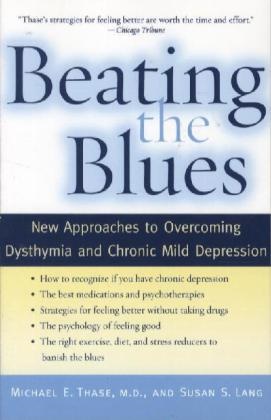Read more
Zusatztext "This book is a step forward. Dr. Thase is an expert in depression, with a wealth of clinical experience, scholarly knowledge, and a scientist's incisive judgment. His research encompasses both biological and psychotherapeutic treatments. The reader of Beating the Blues can trust what he or she learns. This book helps bridge the gap between knowledge and its practical application to heal." --Alan J. Gelenberg, M.D., Professor and Head, Department of Psychiatry, University of Arizona College of Medicine, and Founding Editor of Biological Therapies in Psychiatry Newsletter and Editor-in-Chief, The Journal of Clinical Psychiatry Informationen zum Autor Michael E. Thase M.D. is Professor of Psychiatry and Medical Director of the Mood Disorders Module at the University of Pittsburgh School of Medicine. He is also Chief of the Division of Adult Academic Psychiatry and Western Psychiatric Institute and Clinic, in Pittsburgh. Susan S. Lang is an award-winning Senior Science Writer at Cornell University and author of 11 other books and hundreds of magazine articles on health and psychology. Klappentext Persistent mild depression, which afflicts up to 35 million Americans, can be readily and permanently cured. Thase and Lang show how chronic mild depression can be relieved by learning strategies that help readers to recognize negative and distorted thinking patterns that lead to a downward spiral of pessimism. Zusammenfassung Shows how chronic mild depression can be relieved by learning strategies that help us to recognize negative and distorted thinking patterns that lead to a downward spiral of pessimism. This book reveals that a combination of medication and therapy has been shown to be the most effective treatment for mild depression. Inhaltsverzeichnis Part I: Understanding Dysthymia and its Milder Forms 1: What is Dysthymia? 2: The Spectrum of Dysthymia and Depression 3: How Dysthymia is Diagnosed 4: Who Gets Dysthymia and Why: Causes and Risk Factors Part II: How to Feel Better 5: The Psychology of Feeling Good 6: Psychotherapy 7: Medications 8: Exercise and Nutrition 9: Herbal and Other Supplements 10: Supplemental Strategies Part III: Special Concerns of Various Populations 11: Dysthymia in Children, Adolescents and Young Adults 12: Gender and Dysthymia 13: Dysthymia and Ageing Conclusion: Putting It All Together Appendix I: Daily Symptom Log Appendix II: Most Commonly Used Antidepressants for Dysthymia Appendix III: Resources ...

